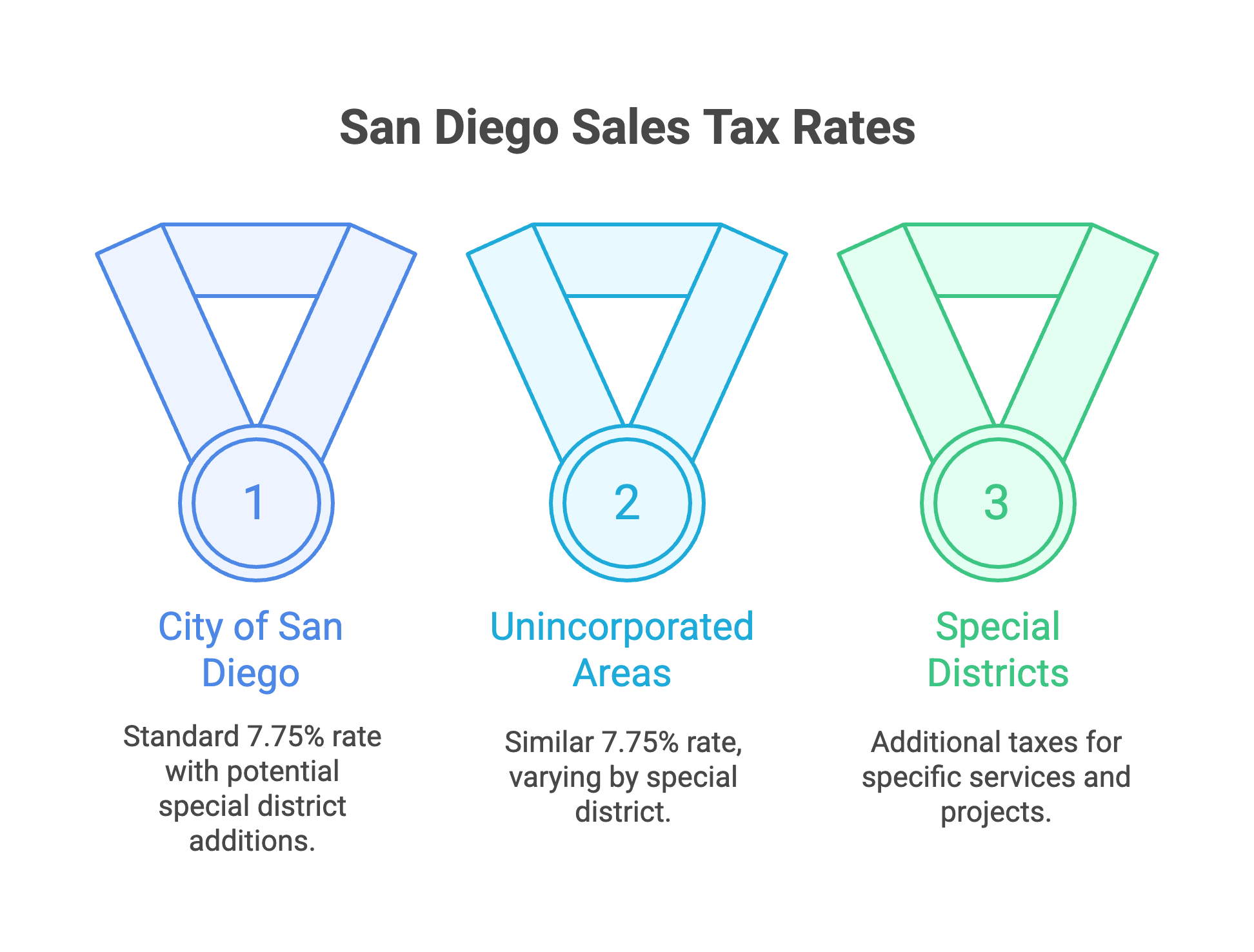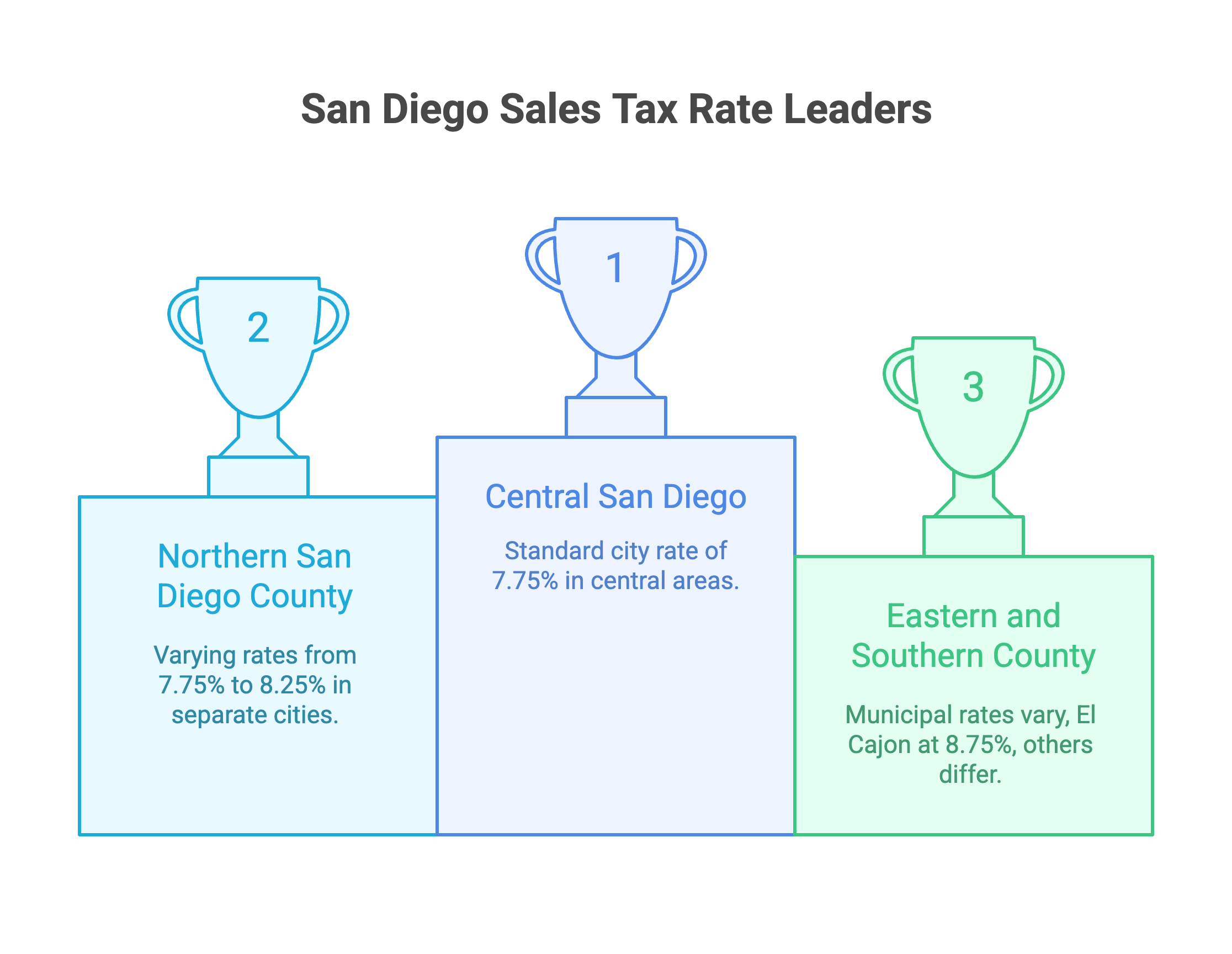San Diego's sales tax system combines multiple layers that can confuse even experienced business owners. The total rate you charge customers depends on where your business is located and where you make sales within San Diego County. Understanding this structure helps you stay compliant while avoiding overpayment or underpayment issues.
The base California sales tax rate forms the foundation, but San Diego County and the City of San Diego each add their own local rates. Additionally, special districts within certain areas impose additional taxes for specific purposes like transportation or public safety improvements.
What makes San Diego sales tax particularly complex is that rates can vary significantly within short distances. A business in downtown San Diego might charge a different rate than one just a few miles away in a different district. This geographic variation requires careful attention to where each sale occurs.
For businesses operating across multiple locations in San Diego County, understanding these rate differences becomes crucial for proper tax collection and remittance to the California Department of Tax and Fee Administration (CDTFA).

The City of San Diego's combined sales tax rate currently stands at 7.75%, which includes the state base rate plus local additions. This rate applies to most transactions within the city limits, though certain special districts may have additional charges.
Different neighborhoods within San Diego may fall under various special assessment districts that can add small amounts to the base city rate. These district taxes typically range from 0.25% to 0.5% and fund specific local improvements or services.
For businesses located within the city boundaries, the 7.75% rate applies to most retail sales, with some exceptions for specific types of goods or services that may be exempt or subject to different treatment under California tax law.
The city rate applies consistently across most San Diego neighborhoods, including downtown, Hillcrest, Mission Valley, Pacific Beach, and other major areas within the incorporated city limits.
San Diego County's unincorporated areas typically have a combined sales tax rate of 7.75%, similar to the city rate but with different local components. These areas include many rural and suburban communities that aren't within any city boundaries.
Unincorporated areas may have their own special districts that can affect the total rate. These might include fire protection districts, library districts, or other local service areas that add small amounts to the base county rate.
Businesses operating in unincorporated areas should verify their specific location's rate, as some special districts only apply to certain geographic areas within the broader unincorporated county.
The county rate structure helps fund county services like sheriff's protection, county health services, and infrastructure maintenance in areas without city governments.
Certain areas within San Diego County have additional special district taxes that can bring total rates above the standard 7.75%. These districts fund specific services like transportation improvements, public safety enhancements, or infrastructure projects.
The Metropolitan Transit System (MTS) tax district covers much of the urbanized area and adds a small percentage to support public transportation. This district includes most of the city and many surrounding communities.
Some newer development areas have Community Facilities Districts (CFDs) that add taxes to fund infrastructure or services specific to those communities. These rates can vary significantly and may change over time as bonds are paid off.
Businesses should check with the CDTFA or use their online rate lookup tool to determine if their location falls within any special districts that affect the total sales tax rate.

Downtown San Diego zip codes (92101, 92103, 92116) typically have the standard city rate of 7.75%. These central areas have relatively straightforward rate structures without many special districts.
The Balboa Park and Hillcrest areas (92103, 92104) maintain the standard rate, while nearby Mission Hills and University Heights generally follow the same pattern.
Mid-City areas including Normal Heights (92116) and North Park (92104) typically use the standard city rate, though businesses should verify specific addresses to confirm district boundaries.
The airport area (92106) and Harbor Island locations may have slight variations due to special assessment districts related to airport or port operations.
North County areas like Escondido, Vista, and Carlsbad are separate cities with their own tax rates that may differ from San Diego city rates. These range from 7.75% to 8.25% depending on local city and district taxes.
Oceanside and Encinitas have their own municipal rates that include city taxes in addition to the state and county base rates. Business owners in these areas need to verify their specific city's current rate.
Unincorporated North County areas generally follow the county rate structure, though some special districts may apply in certain neighborhoods or developments.
The rate differences between neighboring cities in North County can be significant enough to affect purchasing decisions for major items, making accurate rate determination important for competitive reasons.
East County communities like El Cajon, Santee, and La Mesa each have their own municipal tax rates. El Cajon's rate typically runs around 8.75%, while other cities may have different combinations of local taxes.
Chula Vista and National City in South County have their own rate structures that reflect their municipal priorities and special district participation. These rates can range from 7.75% to 8.25% depending on location.
Border communities may have special considerations due to their proximity to Mexico, though this doesn't typically affect standard sales tax rates for most transactions.
Rural East County unincorporated areas generally use the county base rate, though some special districts for fire protection or other services may add small amounts.
Every business making taxable sales in San Diego must obtain a seller's permit from the CDTFA before beginning operations. This permit allows you to collect sales tax from customers and authorizes you to purchase goods for resale without paying sales tax.
The permit application process requires business information, ownership details, and estimated sales volumes. The CDTFA uses this information to determine your filing frequency and deposit requirements.
California requires permits for businesses with any level of sales activity, unlike some states that have minimum thresholds. Even occasional sales or seasonal businesses typically need permits.
The permit is free to obtain, though the CDTFA may require security deposits from businesses in certain industries or with limited credit history.
Most San Diego businesses file sales tax returns monthly, quarterly, or annually based on their sales volume and the CDTFA's assignment. Higher-volume businesses typically file monthly, while smaller operations may qualify for quarterly or annual filing.
Monthly filers must submit returns by the last day of the month following the reporting period. Quarterly filers have until the last day of the month following the end of each quarter.
Annual filers, typically businesses with very low sales volumes, must file by January 31st following the tax year. However, most active businesses in San Diego will be assigned monthly or quarterly filing frequencies.
Electronic filing is required for most businesses, and the CDTFA provides online systems for return preparation and submission. Payment can be made electronically along with return filing.
California requires businesses to maintain detailed records of all sales transactions, including documentation of exempt sales and proper customer exemption certificates.
Sales records should include invoices, receipts, cash register tapes, and any other documents showing the details of each transaction. These records must be kept for at least four years from the filing deadline.
Exemption certificates must be obtained from customers claiming exemptions and kept on file to support exempt sales reported on returns. Invalid or missing certificates can result in penalties and interest on unpaid taxes.
The CDTFA conducts audits of sales tax returns and may examine records going back several years. Proper record keeping helps ensure smooth audits and demonstrates compliance with tax laws.
Modern point-of-sale systems can automatically calculate the correct San Diego sales tax rate based on the business location and transaction details. This automation reduces errors and ensures consistent rate application.
Cloud-based tax calculation services provide real-time rate updates when local jurisdictions change their rates. These services typically integrate with popular accounting and e-commerce platforms.
For businesses with multiple locations across San Diego County, automated systems can apply the correct rate for each location without manual intervention by staff members.
Integration with accounting systems ensures that collected taxes are properly recorded and ready for return preparation and filing with the CDTFA.
Specialized sales tax compliance software can automate much of the return preparation and filing process. These systems pull transaction data from your accounting system and prepare returns in the CDTFA's required format.
Some software solutions provide audit support by maintaining detailed transaction records and generating reports that demonstrate compliance with California tax laws.
Cloud-based solutions offer advantages for businesses with multiple locations or remote management needs, allowing access to tax information from anywhere with internet connectivity.
The cost of compliance software is often justified by the time savings and reduced error rates compared to manual return preparation and filing processes.
Q: What is the current San Diego sales tax rate for 2025? A: The standard San Diego city sales tax rate is 7.75%, though rates can vary slightly depending on special districts. Some areas of San Diego County have rates ranging from 7.75% to 8.25% depending on local city and district taxes.
Q: Do I need to collect different sales tax rates for different areas of San Diego County? A: Yes, if you have multiple locations or make sales in different cities within San Diego County, you need to collect the appropriate rate for each location. Each city and special district has its own rate structure.
Q: How do I find the exact sales tax rate for a specific San Diego address? A: Use the CDTFA's online sales tax rate lookup tool on their official website. Enter the complete address to get the current combined rate including all applicable state, county, city, and district taxes.
Q: What happens if I collect the wrong sales tax rate in San Diego? A: If you collect too little tax, you're responsible for paying the difference plus penalties and interest. If you collect too much, you should refund the excess to customers or remit it to the CDTFA as additional tax.
Q: Are there any sales tax exemptions available in San Diego? A: California provides various exemptions for items like groceries, prescription medications, and sales for resale. Some exemptions require proper documentation from customers. Check with the CDTFA for a complete list of exemptions.
Q: How often do San Diego sales tax rates change? A: Rates can change when local jurisdictions pass new tax measures or when special districts are created or modified. The CDTFA provides advance notice of rate changes, typically effective at the beginning of calendar quarters.
Q: Do I need to collect San Diego sales tax on online sales to local customers? A: Yes, if you have nexus in California (physical presence, employees, or meet economic thresholds), you must collect California sales tax on sales to customers throughout the state, including San Diego.
Q: What records do I need to keep for San Diego sales tax compliance? A: Maintain detailed records of all sales transactions, including invoices, receipts, cash register tapes, and exemption certificates. Keep these records for at least four years from the filing deadline to support your returns and prepare for potential audits.

A practical comparison of hiring a freelancer vs using a dedicated offshore accounting team, focusing on continuity, quality control, security, and scaling.

How CPA firms outsource payroll and 1099 work to reduce penalties and admin load, with a clean workflow for approvals, filings, and year-end reporting.

Practical do's and don'ts for CPA firms outsourcing accounting work, based on common failure points and what successful rollouts do differently.